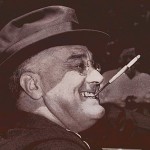When Presidents Go Beyond the Law
 In my recent bloggingheads with Glenn Greenwald we spoke about whether presidents can ever be forgiven for breaking the law. I argued that they ought to avoid it where possible, but sometimes they have to gamble.
In my recent bloggingheads with Glenn Greenwald we spoke about whether presidents can ever be forgiven for breaking the law. I argued that they ought to avoid it where possible, but sometimes they have to gamble.
My recent bloggingheads with Glenn Greenwald built up to a fundamental divide, and one that I do think is at the core of the divide between conservatism on the one hand and liberalism (and its cousin, libertarianism) on the other:
Glenn and I were talking about whether presidents can ever be forgiven for breaking the law. I answered that they ought to avoid it where possible, but sometimes they have to gamble. FDR violated neutrality laws in 1941 to fight an undeclared naval war against Germany. He acted outside the rules of the system, with no excuse other than that he trusted (correctly) that future generations would condone his actions as correct.
Such moments represent huge risks for presidents. Ronald Reagan gambled in such a way during Iran-Contra, and it nearly wrecked his presidency. There is no way to predict in advance the right choice at any given moment. The safety of the public is the supreme law, but this law speaks clearly only after the fact.
Greenwald asked, What if ordinary people excused rule-breaking in a similar way? Necessity made me do it?
I could have answered that necessity can sometimes be an excuse for ordinary people too: homicide is not punishable when done in self-defense.
But time was running short, so I answered with a quote from one of the most interesting (but troubling!) figures of 19th century politics, the Italian unifier Count Cavour. As he once said to associates: "Gentlemen, if we did for ourselves what we have done for Italy, what great scoundrels we should be."